15 Products
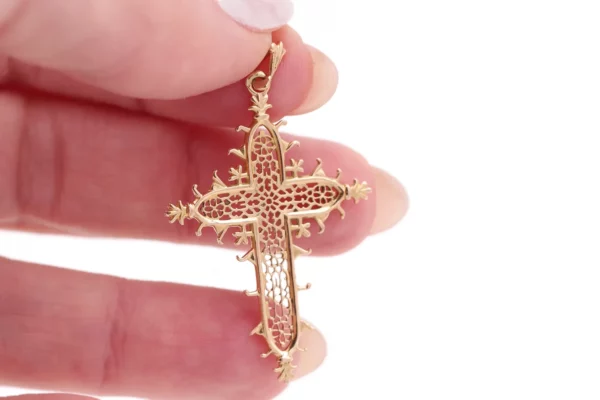
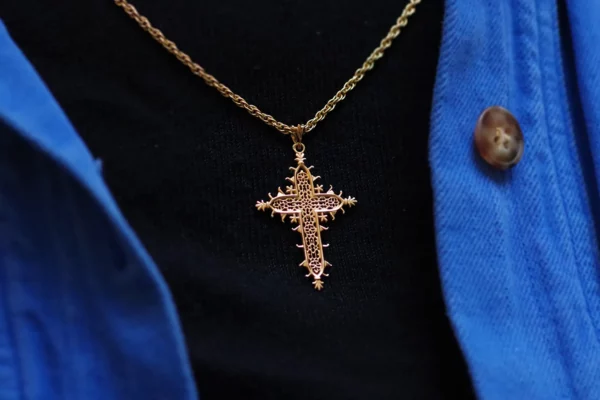
Estaing bridge cross pendant by Becker in 18 karat yellow gold. Pendant featuring an openwork cross with a Gothic appearance, referring to the cross on the Estaing bridge. Cross pendant, mid-20th century, France.
Partially visible eagle head hallmark (french state hallmark for 18 karat gold)
Height (including setting): 4 cm
Width: 2.5 cm
Condition: slight wear scratches
Weight : 2.52 gr
More : The village of Estaing is a passageway used by pilgrims on their way to Santiago de Compostela. It is famous for its medieval chateau and bridge. It is on this bridge that the cast-iron Estaing cross stands, which inspired the creation of the yellow gold cross by BECKER Paris in 1903.
*The antique gold chain is not sold with the jewel*
See our antique chains
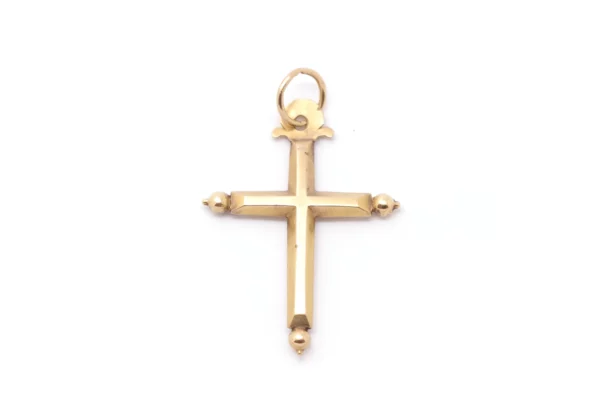
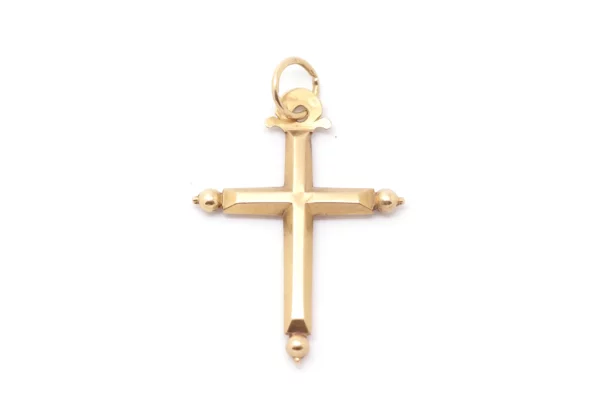
French victorian cross pendant in 18 karat (750). Small religious cross called ‘croix bâton’, it is made of hollow gold. The arms of the cross are smooth and decorated at the ends with a sphere and a point. The top part is shaped like a fleuron and holds a ring for wearing as a pendant. Antique cross, early 19ᵉ century, French regional jewellery, Brittany.
Regional antique hallmark, owl hallmark.
Height (with hoop): 32 mm
Width: 25 mm
Condition: scratches from use
Weight : 1,2 gr
*The antique gold chain is not sold with the jewel*
See our antique chains
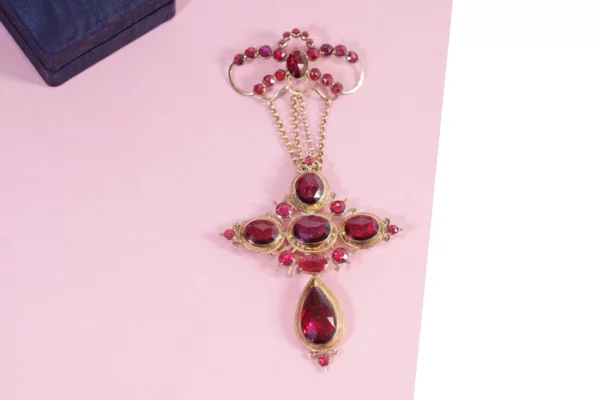
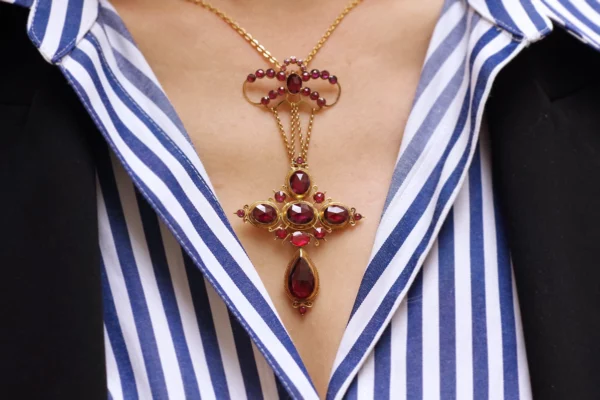
Badine Perpignan garnet cross in 18 karat rose gold. Antique pendant in the form of a cross with two elements: a knot at the top and a large cross at the bottom. The two elements are linked by four fine chains. The lower part of the cross is mobile. The entire piece is set with 33 garnets on red foils, cut in round, oval and drop shapes. This is a typical piece of jewelry from the Perpignan region. The term “badine” indicates that the lower part of the cross is mobile. French regional antique jewelry, Languedoc Roussillon, Perpignan, early 20th century.
Owl hallmarks (french state hallmark for 18 karat gold)
Dimensions: 10 x 5 cm
Size of largest garnet: 15 x 10 mm
Condition: small dents, scratches and oxidation
Weight: 11.45 gr
Further information: These jewels were often worn on a velvet or silk ribbon, as in the “Portrait de Clara Salamo à la croix badine”, Paris, 1880, painted by A.Legras (see photo)
*The antique gold chain is not sold with the jewel*
See our antique chains
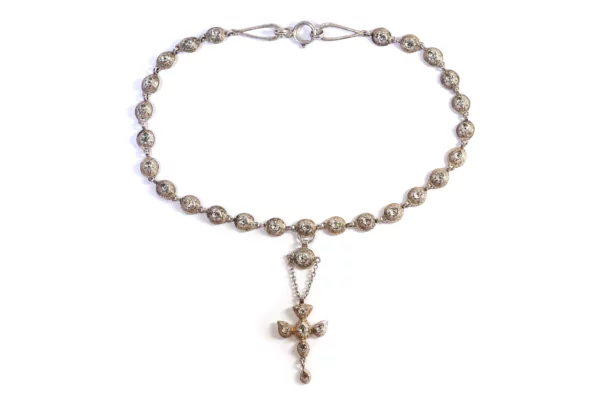
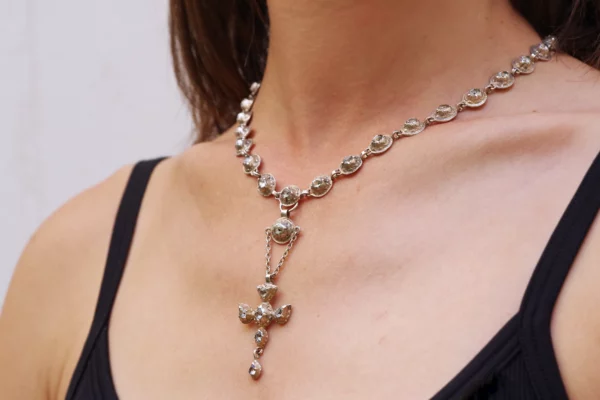
Victorian paste holy spirit necklace in silver. Antique silver necklace featuring round elements set with white paste stones in a closed setting, holding a Holy Spirit pendant also set with paste stones. The pendant depicts a dove with outstretched wings, head down. 19th century regional necklace, France.
Boar and VD goldsmith’s hallmarks.
Length: 43 cm
Pendant height: 7 cm
Width of pendant: 2.5 cm
Condition: one clasp has been changed
Weight: 57.91 gr
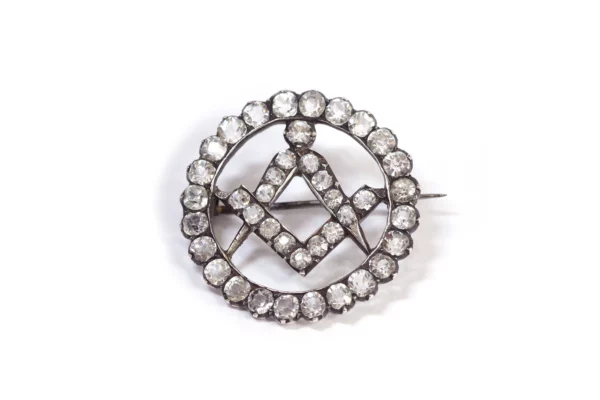
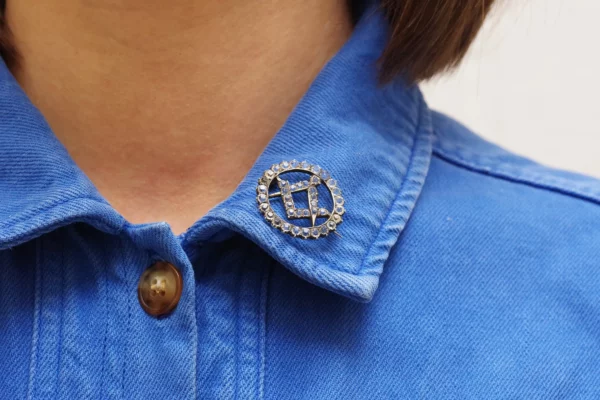
Antique Masonic brooch in silver. Masonic brooch featuring the Square and Compasses within a circle, set with rhinestones. The combination of the Square and Compasses forms a square within the circle, symbolizing matter surrounded by the spiritual. The reunion of body and spirit can be supported by the quest for the squaring of the circle. In Masonic believes, the Compass symbolizes spiritual measurement and the individual’s ability to keep their actions within the bounds of what is right and appropriate. It also represents the capacity for self-assessment and improvement. The Square, on the other hand, represents the virtue of living a straight and balanced life, while respecting moral and ethical laws. Antique brooch, circa 1900.
Swan hallmark (french state hallmark for silver)
Diameter: 26 mm
Condition: signs of wear
Weight: 3.76 gr
*The antique gold chain is not sold with the jewel*
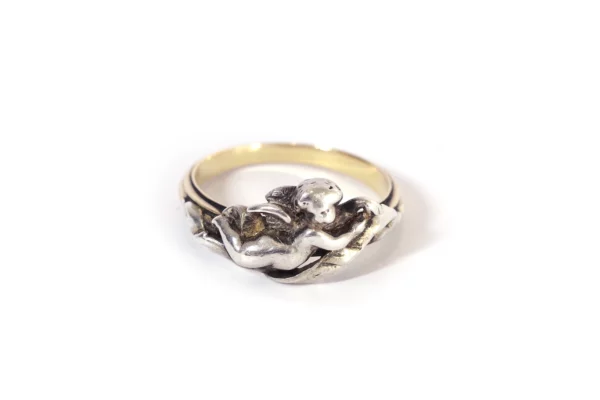
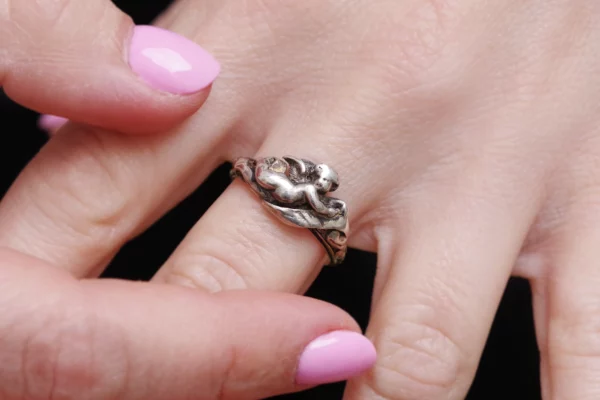
Fannière Frères angel ring in 18 karat gold and silver 800. Antique ring with charming decoration, depicting an angel holding a ribbon. The angel is in silver, mounted on a gold ring soberly decorated with fine striations. The ring is signed on the inside. Ring made by the Frères Fannière, famous 19th-century silversmiths, circa 1870, France.
Fannières Frères signature, trace of eagle head, owl and swan hallmarks
Finger size: 55 UE or 6.75 US (can be changed)
Angel size: 10 x 16 mm
Condition: light usual scratches, patinated silver
Weight: 4.68 g
More information : The company was founded in 1839 by François-Auguste Fannière (1818-1900) and François-Joseph-Louis Fannière (1820-1897), nephews and students of goldsmith Fauconnier. At once designers, sculptors, chiselers and manufacturers, they worked for leading Paris silversmiths such as Baugrand, Duron, Wiese, Odiot, Froment-Meurice and Christofle, then under their own name from 1862. The company was taken over in 1900 by François-Joseph-Louis Fannière’s son, then by Fernand Poisson. Few pieces of jewelry have survived.
*The antique box is not sold with the jewel*
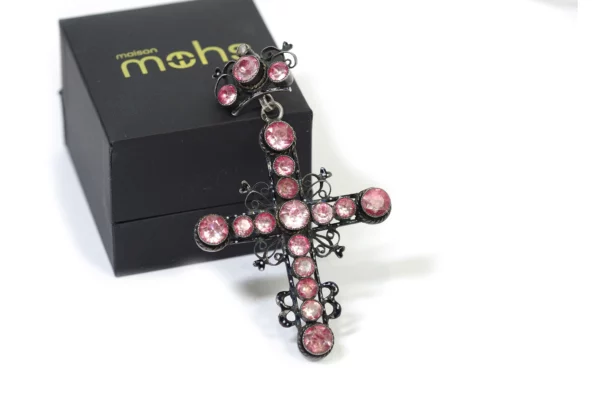
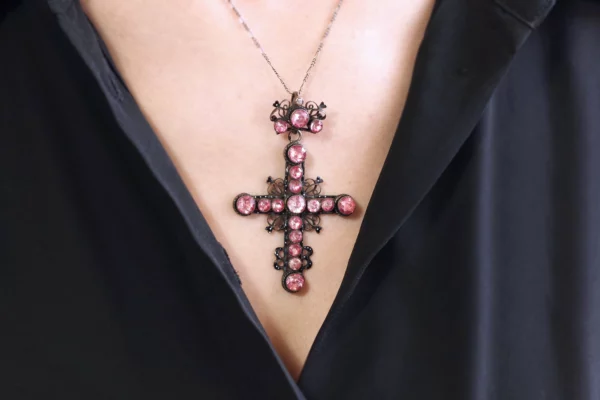
Victorian French enamel foiled paste cross pendant in silver. This cross is in silver with filigree decoration, forming a cross adorn with paste faceted pink glasses on spangles meant to have a look of pink topaz. A black enamel decoration with white dots covers the entire pendant. A glass bead adorns the upper part of the composition. The bezels are completely closed. French work from the beginning of the 19th century
French work from the middle of the 19th century
Wild boar hallmark
Width: 4.3 cm
Condition: lack of enamel, cracks.
Weight: 13.37 g
*The antique gold chain is not sold with the jewel*
See our antique chains
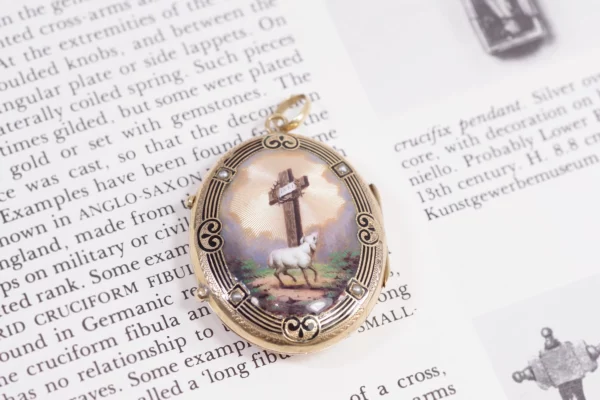
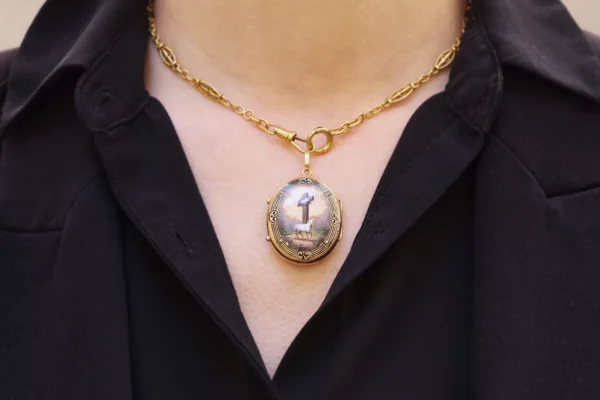
Enameled Swiss antique locket in 14 karat gold. Antique opening medallion with enamel decoration on a guilloché background depicting a lamb at the foot of the Cross, bearing the inscription “INRI”, meaning the Latin words Iesus Nazarenus Rex Iudaeorum, i.e. “Jesus the Nazarene King of the Jews”, whom Pilate had placed on the Cross. Jesus, also known as the “Lamb of God who takes away the sins of the world”, is likened to a sacrificial lamb. The contours of the medallion are decorated with fine half-pearls and black enamel. The reverse of the pendant is decorated with chasing and black enamel forming hearts around a rhombus. The locket can be opened to conceal a photograph. It can be worn either way. Antique opening pendant, circa 1880, Switzerland.
Trefoil hallmark for the clasp in 9k, the rest tested 14 karats
Height (including setting): 42 mm
Width: 27 mm
Depth: 9 mm
Condition: tiny missing at bottom left, fine scratches
Weight : 6.68 gr
*The antique gold chain is not sold with the jewel*
See our antique chains
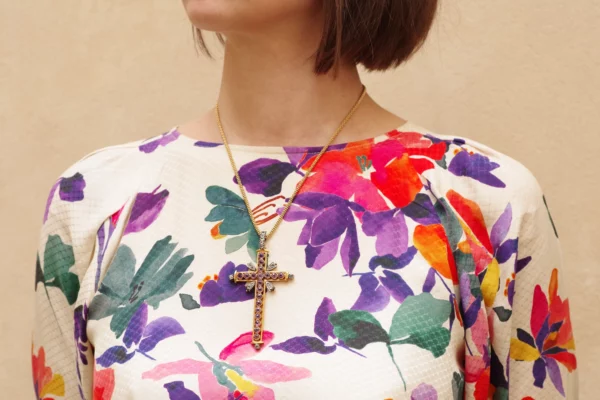
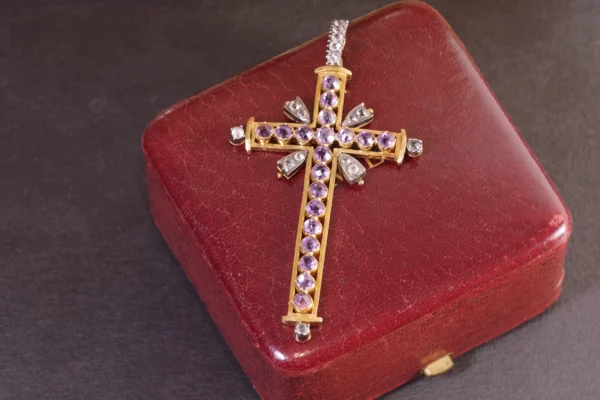
Large amethyst cross pendant in 18 karat (750) yellow gold and silver. Large religious cross to be worn as a pendant, set with 19 round facetted amethysts and paste white stones. Religious ceremonial jewellery, late 19th century, southern France or Italy.
Owl and swan hallmarks (French State hallmarks for 18 karat gold and silver).
Dimensions: 90 x 50 mm
Condition: scratches from use, small dents.
Weight: 28.86 gr
*The antique box and the chain are not sold with the jewel*
See our antique chains
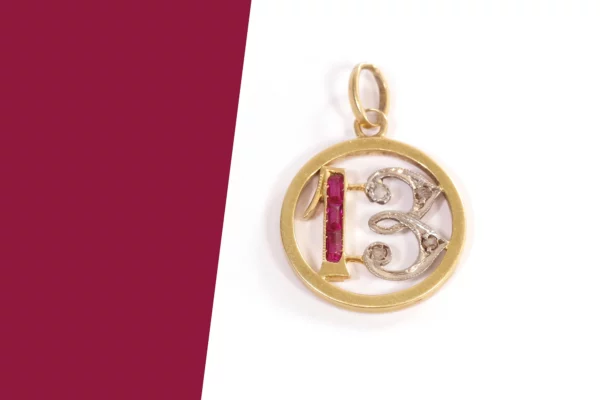
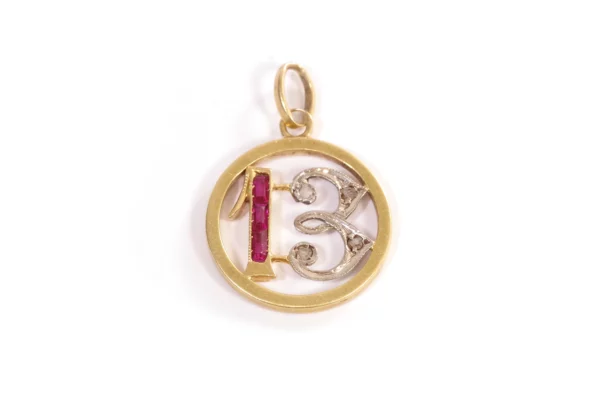
Art Deco Edwardian pendant 13 in 18-karat rose gold (750) and platinum. Lucky charm pendant featuring the number 13 at its center, set with 3 synthetic rubies and 4 rose-cut diamonds. These small lucky charm medallions were fashionable in the early 20th century, during the Art Deco period, around 1920-1930.
Traces of an eagle head hallmark
Dimensions (including the bail): 21 x 10 mm
Note : watch the video to get an idea of the size.
Condition: scratches from use
Weight: 0.96 gr
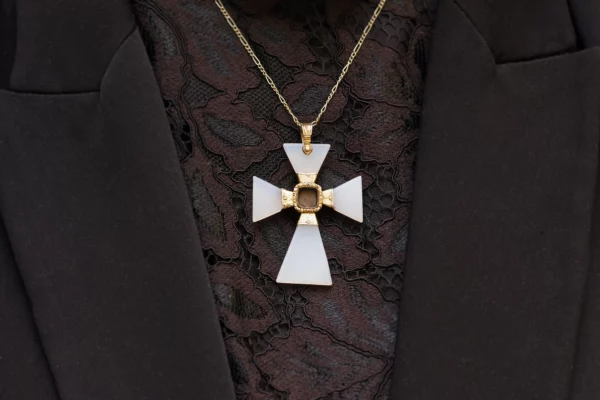
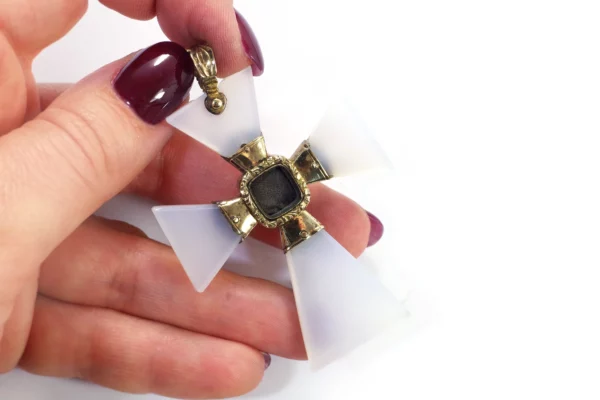
Georgian Maltese cross chalcedony pendant in 9k gold. This antique reliquary cross is made of four chalcedony elements forming a cross, held together by a central gold element with delicate engraving. This central element likely originally contained a woven lock of hair beneath glass, although it is no longer present. The pendant has an intricately decorated bail. This Georgian cross t is from around 1820.
Trefoil hallmark
Dimensions: 60 x 34 mm.
Note: Similar Georgian Maltese crosses can be seen in the Victoria & Albert Museum in England.
Condition: Missing the central protective glass, some oxidation.
Weight: 11.26 gr
*The antique gold chain is not sold with the jewel*
See our antique chains
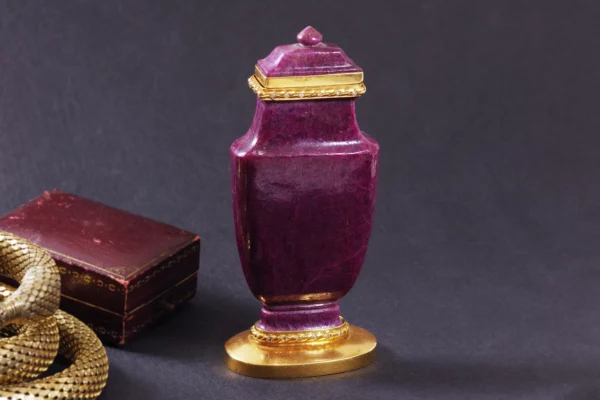
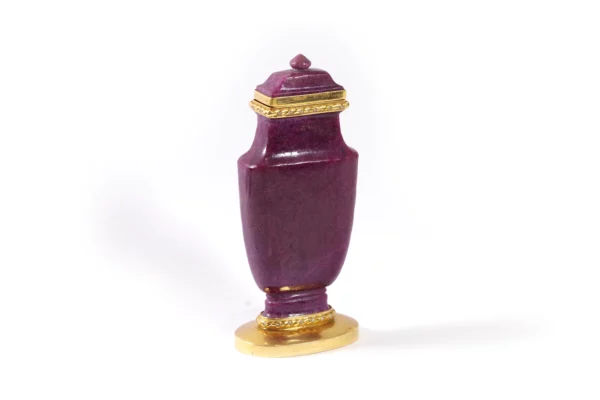
Ruby diamond gold bottle vase with 18k yellow gold setting. This small covered pot is intricately carved from a ruby root and features a mount made of 18k yellow gold on the neck, lid, and base. The neck and base are adorned with a frieze set with 32 diamonds of varying cuts (a mix of old and brilliant cuts). This is a decorative object from the 20th century with foreign craftsmanship. It is stamped with the owl hallmark.
Dimensions: 11 x 4.5 cm
Estimated weight of the ruby: 1050 carats
Total estimated diamond weight: 0.32 carats
Note: This vase comes with a certificate issued by the Public Service for the Control of Diamonds, Fine Pearls, and Gemstones, dated September 21, 1998.
Weight: 208.11 gr
